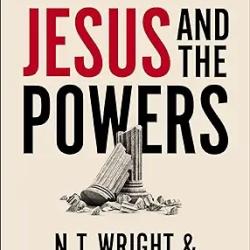One of the regular critiques of Wright’s views from the Reformed side of the equation comes from folk like Carson and Seifrid who stress that in the Hebrew Bible the term berith and the term sedeq almost never occur in close proximity. Tom counters this observation by pointing to Gen. 15. But this is problematic as well, because in Gen. 15 itself, Abram’s faith is credited as righteousness PRIOR to there even being a covenant made between God and Abram. Indeed, when Abram asks ‘Lord how can I know I will gain possession of it?’ it is only then that God initiates a covenant with Abram, and in this case in response to his question about what God promised. Since Abram’s righteousness precedes the account of the covenanting, it really does not seem to be the case that Gen. 15 is a place where righteousness=covenant faithfulness, especially since, it is Abram’s own trusting God (or believing what God said, taking him at his word) that is reckoned as righteousness. Nothing is said about God’s righteousness at that point, or later in this text. There is as well nothing in Gen. 12 to alter this conclusion either. God’s act of covenanting with Abraham is to reassure him that what God had previously promised would come true. As for Rom. 4.21 there circumcision is said to be a sign or seal of the righteousness Abram had by faith. The fact that the LXX sometimes substitutes dikaiosune for diatheke does not change what the Hebrew text says, nor does it provide a warrant for seeing ‘righteousness’ in Rom. 4.21 as =covenant faithfulness. But see Tom’s discussion and debate with Carson et al. on p. 1002 and the notes.
Tom is however right that Paul is claiming in Rom. 4 that “when someone believes in the one who declares the ungodly to be in the right then they have done nothing to earn the status of being ‘world-inheritor’ (4.13).” (p. 1004). This in turn means that when Paul speaks of Abraham’s ‘reward’ that latter word does not carry the connotation of something given for services properly rendered. Tom goes on to stress that if God promised Abraham he’d be the father to many nations, this entailed, in Paul’s view, the forgiving of the sins of the ungodly, of the Gentiles (see Gal. 2.15). Tom also rightly points out the Jewish view that God ultimately promised ‘the inheritance not merely of the promised land, but of the whole world’ (cf. Job. 17.3; 22.14; Sir.44.21; 1 En. 5.7; 4 Ez. 7.59).
So then is it Abraham who sets things right, reversing the curse, reversing Adam’s sin by trusting God? No, as Tom stresses, it was God, in Christ, who would do this. So the answer to the question is Abraham our father according to the flesh is no– if by our, Paul has in mind Gentiles and Jews. He is the father through faith in the promise of the many nations. But if, as Tom says, it would be God reversing the curse (through Jesus), then in fact it must be doubted that God ever suggested the world would be saved by or through the people of God, Israel. Salvation may come from the Jews, in the since that their representative would be the savior, but it is not of the Jews, nor was it their mission to save the world. This blending together of ideas confuses and fuses separate matters– being a light and a blessing to the nations is one thing, which was indeed Israel’s job. Being a world savior was quite another (but see p. 1007). The discussion of Rom. 5-8 on pp. 1008ff. is basically a rerun, but one comment is in order. Tom takes the whole of Romans 1-8 (and indeed more) as one long argument. He recognizes the rhetoric involved, but what he fails to come to grips with is the thesis statement in 1.16-17 as a thesis state, and the further amplification of the thesis statement in Rom.3. Furthermore, what we have in Rom 1-8 is a series of arguments, not one long argument, and in those arguments sometimes Paul is talking about Gentiles, sometimes about Jews, and for instance in Rom. 5.1-11 about Christians. He is not talking about all of them all the time, and most certainly he is not talking about Israel in Rom. 7.7-13! Tom gets around this problem by suggesting that Israel was in Adam. It would be much better to say that Adam is the forefather of both Gentiles and Jews, even in the flesh, and that the universalism of sin (all have sinned) is dealt with in Rom. 7 by talking about both Jews and Gentiles (the latter who are said in Rom. 2 to have the law in some sense written on their hearts). In other words, the emphasis clearly in Rom. 7 (and not surprisingly since most of the audience is Gentiles) is on all those in Adam, in a pre-Christian condition. The emphasis is not on Israel, nor is Israel particularly being singled out for discussion in Romans 7.
And one more thing. Paul is perfectly capable of using the full range of meanings of the word nomos just as he is able to use the diakosune and cognate terms in a variety of ways. It is totally unnecessary and not helpful to insist that wherever the term nomos shows up, The Torah is in view, indeed the Mosaic Law. This is simply not true. It is not true when the story of Adam is retold, Adam who alone received only one commandment (see Rom. 7.7-13). It is further more two laws or ruling principles that are at issue at the end of Romans 7 (the law of the mind, which could be God’s law, and the ‘other law’ a very different ruling principle) and in Rom. 8 where Paul talks about the law of sin and death as opposed to the ruling principle and power of the Spirit which brings life and sanctification. The attempt to make such terms as nomos or dikaosune univocal does not work. The meaning is determined by the context, and contexts differ. It is not Israel being discussed in the first place in Rom. 5.12ff, Rom. 6 and Rom. 7– it is fallen humanity in Adam (contra pp. 1014-15). It is interesting that initially when Tom reflected on Romans 7 he had accepted the traditional view of Cranfield and others that Romans 7 describes the Christian. See p. 1016 and notes 684,85, and especially 686. Tom may well be right however that Rom. 8.10 and its reference to righteousness refers to the righteousness of the believer as opposed to the sin of the believer (p. 1019 and n. 692).
Finally, in the discussion on p. 1012 Tom rightly cites Rom. 9.4-5 to help illuminate what has been previously said in Romans 8. This is a yes, but also a no. It’s a no because Paul will say that Israelites have both the sonship and the covenants plural…… notice the reference to covenants plural. Paul does not think of the new covenant as a renewal or completion of the Mosaic covenant. He links it with the Abrahamic covenant instead. The sonship of the covenant people is not the same as the only begotten Son’s sonship, and it is only ‘according to the flesh’ that the Messiah comes from them, a phrase that Paul regularly sets over against ‘from the Spirit’. This is precisely because the Messiah is much more than a true Jew, he is God over all to be worshipped, and he fulfills the role of savior because he is God come to rescue. The privileges of Israel is one thing, the privileges and power and role of the savior another. Jesus does not come to simply fulfill the mission that Israel tried and failed to do. He comes to fulfill a mission that Scripture says only God could ever do when it comes to fallen human beings.
On p. 1006 Tom rightly stresses a key point— “the character of faith alters depending on what sort of God one believes in”. This is so true, and can be seen even today when trying to figure out what sort of one God Muslims actually believe in. The character of the faith depends on what is believed about the deity.














